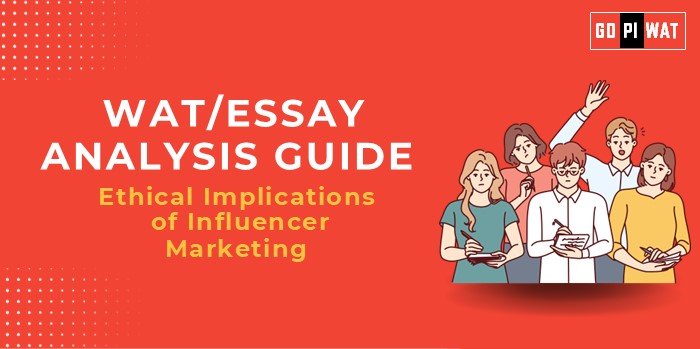🌟 Ethical Implications of Influencer Marketing
📝 WAT/Essay Analysis Guide
🔍 Understanding the Topic’s Importance
Ethical concerns in influencer marketing directly relate to corporate responsibility, consumer trust, and regulatory policies. For B-school students, this connects with marketing ethics, brand management, and strategic communications.
⏳ Effective Planning and Writing
- Time Allocation:
- Planning: 5 minutes
- Writing: 20 minutes
- Reviewing: 5 minutes
- Preparation Tips:
- Gather data on influencer trends and regulations.
- Note real-life cases and consumer impact.
💡 Introduction Techniques for Essays
- Contrast Approach: “While influencer marketing drives brand visibility, ethical lapses risk long-term trust.”
- Solution-Based Approach: “Regulating influencer marketing is crucial to ensuring transparency and consumer protection.”
📚 Structuring the Essay Body
- Achievements: Increased accessibility for small businesses, innovative advertising models.
- Challenges: Undisclosed ads, mental health impacts, regulatory gaps.
- Future Outlook: Recommendations for ethical marketing practices, role of technology in transparency.
✅ Concluding Effectively
- Balanced Perspective: “Ethical challenges must be addressed to ensure influencer marketing remains a credible and impactful strategy.”
- Global Comparison: “Learning from countries with stricter regulations can help shape a globally ethical framework.”
✍️ Sample Short Essays
Balanced Perspective
“Influencer marketing combines creativity and reach, yet its unregulated nature often breeds mistrust. Strengthening ethical standards is essential to sustain its benefits.”
Solution-Oriented
“Transparency mandates and consumer awareness campaigns can mitigate the ethical risks of influencer marketing, ensuring a win-win for brands and audiences.”
Global Comparison
“By adopting practices from regulated markets like the UK, influencer marketing worldwide can evolve into a more ethical and effective industry.”


